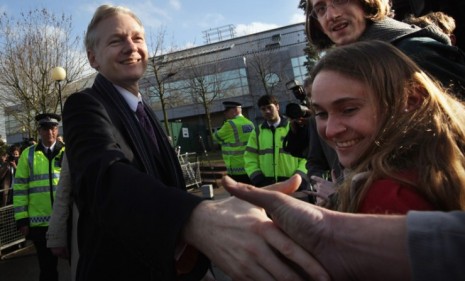Irony alert: Julian Assange's 'draconian' confidentiality demands
His organization, WikiLeaks, is devoted to revealing whistleblowers' secrets. But WikiLeaks staffers who fail to keep their own mouths shut risk a $20 million fine

A free daily email with the biggest news stories of the day – and the best features from TheWeek.com
You are now subscribed
Your newsletter sign-up was successful
The story: WikiLeaks founder Julian Assange made his name exposing U.S. government secrets provided by whistleblowers, but despite his commitment to the free flow of information, he forces his own employees to sign a brutally strict confidentiality agreement. The document, obtained by the British magazine New Statesman, imposes a $20 million penalty on any staffer who leaks his secret-spilling website's unpublished material. The rationale: Anyone who does so without authorization owes WikiLeaks the millions it could have made selling the material to broadcasters and publishers.
The reaction: What astonishing hypocrisy, says David Allen Green at Britain's New Statesman. WikiLeaks exists to acquire information that doesn't belong to it, material that Assange then views as his "commercial 'property'" and protects with a "draconian" confidentiality agreement. Now, now — there's nothing draconian, or even unusual, about this nondisclosure agreement, says Kevin Gosztola at WL Central. Wikileaks is just "going to the nth degree to protect the 'sources' it fights to keep anonymous." No, this should shock anyone "who blindly idolized Assange and WikiLeaks simply because they took on governments and powerful people," says Andrew Belonsky at Death + Taxes. Assange is no knight in shining armor — he's just another guy out to make a buck.
A free daily email with the biggest news stories of the day – and the best features from TheWeek.com
The Week
Escape your echo chamber. Get the facts behind the news, plus analysis from multiple perspectives.

Sign up for The Week's Free Newsletters
From our morning news briefing to a weekly Good News Newsletter, get the best of The Week delivered directly to your inbox.
From our morning news briefing to a weekly Good News Newsletter, get the best of The Week delivered directly to your inbox.
-
 Can Europe regain its digital sovereignty?
Can Europe regain its digital sovereignty?Today’s Big Question EU is trying to reduce reliance on US Big Tech and cloud computing in face of hostile Donald Trump, but lack of comparable alternatives remains a worry
-
 The Mandelson files: Labour Svengali’s parting gift to Starmer
The Mandelson files: Labour Svengali’s parting gift to StarmerThe Explainer Texts and emails about Mandelson’s appointment as US ambassador could fuel biggest political scandal ‘for a generation’
-
 Magazine printables - February 13, 2026
Magazine printables - February 13, 2026Puzzle and Quizzes Magazine printables - February 13, 2026
-
 The billionaires’ wealth tax: a catastrophe for California?
The billionaires’ wealth tax: a catastrophe for California?Talking Point Peter Thiel and Larry Page preparing to change state residency
-
 Bari Weiss’ ‘60 Minutes’ scandal is about more than one report
Bari Weiss’ ‘60 Minutes’ scandal is about more than one reportIN THE SPOTLIGHT By blocking an approved segment on a controversial prison holding US deportees in El Salvador, the editor-in-chief of CBS News has become the main story
-
 Has Zohran Mamdani shown the Democrats how to win again?
Has Zohran Mamdani shown the Democrats how to win again?Today’s Big Question New York City mayoral election touted as victory for left-wing populists but moderate centrist wins elsewhere present more complex path for Democratic Party
-
 Millions turn out for anti-Trump ‘No Kings’ rallies
Millions turn out for anti-Trump ‘No Kings’ ralliesSpeed Read An estimated 7 million people participated, 2 million more than at the first ‘No Kings’ protest in June
-
 Ghislaine Maxwell: angling for a Trump pardon
Ghislaine Maxwell: angling for a Trump pardonTalking Point Convicted sex trafficker's testimony could shed new light on president's links to Jeffrey Epstein
-
 The last words and final moments of 40 presidents
The last words and final moments of 40 presidentsThe Explainer Some are eloquent quotes worthy of the holders of the highest office in the nation, and others... aren't
-
 The JFK files: the truth at last?
The JFK files: the truth at last?In The Spotlight More than 64,000 previously classified documents relating the 1963 assassination of John F. Kennedy have been released by the Trump administration
-
 'Seriously, not literally': how should the world take Donald Trump?
'Seriously, not literally': how should the world take Donald Trump?Today's big question White House rhetoric and reality look likely to become increasingly blurred